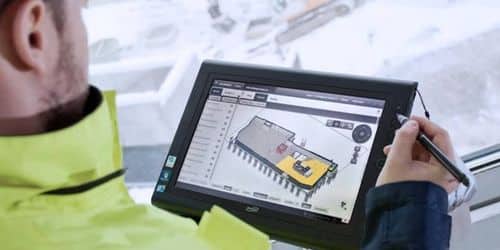Construction project management is not an easy task. To manage a job efficiently, you must keep teams on track, stay within budget, ensure quality, and maintain a safe work environment. Fortunately, there are a variety of software solutions known as construction project management software that can help to streamline all of these processes.
This post will go over the top construction management software systems that contractors, construction managers, and owners may use to efficiently generate schedules, share plan revisions, and maintain daily logs for their projects.
Best Construction Project Management Software
All of the products in this section meet high quality, performing well across all of the measures listed above.
#1. Procore (Best Overall Construction Project Management Software)
Procore is a popular and comprehensive construction project management software package on the market. Their customer service is excellent, as evidenced by an A+ rating from the Better Business Bureau and numerous good online reviews. After functioning as a private corporation based in California since 2002, Procore went public in May of 2021. Procore also provides field service, quality and safety management, and financial management software in addition to project management.
Pros
- The best user interface of any product we reviewed
- The functionality for core construction project management is the best on the market.
- Excellent client service, training, and continuing technical assistance
Cons
- It is not feasible to obtain a price estimate from Procore without first consulting with a sales representative.
- Accounting capabilities are limited.
- Certain workflows are rigid and difficult to implement.
Procore is primarily designed for general contractors, but it is also ideal for construction managers, subcontractors, and owners. The device is completely customizable upon purchase, allowing customers to select the tools they require, making it suitable for any size user or business. However, it is probably best suited for organizations with yearly revenues of $5 million or more.
Procore’s platform is available as an online, cloud-based desktop app. Mobile apps for iOS, Android, and Windows devices are also available. This makes Procore mobile and easy to use, and it is suitable for users that require collaborative features.
Finally, Procore distinguishes itself via exceptional service. Procore subscriptions include product training and continuous support from an amazing team of representatives. Product reviews indicate that Procore’s customer service team is well rated.
Procore is our top suggestion and the Best Overall Construction Project Management Software due to its broad feature set, convenient integrations, and stellar reputation.
#2. Buildertrend (Best for Remodelers)
Buildertrend is a relatively new software startup, having been created in 2007. However, it has quickly become one of the most popular construction project management systems. The organization provides excellent customer service and has an A+ rating with the Better Business Bureau.
Pros
- Excellent features designed exclusively for home builders, remodelers, and their clients, such as communication tools and a client portal.
- A pricing model that is simple and less expensive than competitors
Cons
- Some customers express dissatisfaction with the steep learning curve.
- Some functionality that is vital to commercial clients is missing.
Buildertrend is primarily intended for home construction, remodeling, and specialty contracting, but it can also be utilized for commercial projects. Buildertrend includes a robust set of capabilities for project management and much more. Document and photo storage, punch lists, and plan markup are also available.
Buildertrend integrates with the following software:
- Estimating with ProEst and Clear Estimates
- For takeoff, use Stack, eTakeoff, PrebuiltML, and PlanSwift.
- Accounting software such as Quickbooks and Xero are available.
- Several file-sharing and design applications
Buildertrend features two pricing options, Core and Pro, which both support an unlimited number of projects and users. The basic begins at $99 per month and contains important project management capabilities such as scheduling, daily logs, to-do lists, communication tools, a client portal, and select connectors. Pro pricing begins at $299 per month and includes all of the capabilities of the Basic level as well as capabilities for warranties, surveys, bids, change orders, and much more.
Buildertrend is a fantastic product that was created with home builders and remodelers in mind. As a result, we consider it the Best Construction Project Management Software for Remodelers.
#3. Smartsheet (Best Construction Management Software for Small Business)
Smartsheet is one of the most well-known software solutions for project management in a wide range of professions and businesses. It was first made available to the public in 2006, now has millions of users and rave reviews. Smartsheet has evolved as a great tool for managing construction project management, with a number of templates and features tailored for usage in the construction sector.
Pros
- The familiar and easy spreadsheet-based interface
- Integrations with other popular business software suppliers are extensive.
- Pricing that is clear and reasonable for small business customers
Cons
- The number of integrations with other construction software is rather restricted.
- Despite the availability of construction-focused templates, they are not expressly built for construction.
Smartsheet is a cloud-based application that organizes projects through a spreadsheet-like interface. It includes templates for project timelines and visualizations, estimating, punch lists, closeout checklists, and more for construction users.
Smartsheet has tiered subscriptions with simple pricing for the lower tiers. A Pro subscription costs $7 per user per month but has fewer features and limits each object to 10 views. The Business subscription is $25 per user per month and includes all of the capabilities of the Pro subscription plus more advanced options for generating documents, building reports, and managing workflows. Smartsheet also offers a tailored Enterprise tier for enterprises with more sophisticated demands, which connects more tightly with business processes and provides greater data governance features and customer support.
Finally, Smartsheet lacks several of the industry-specific features and connectors that customers seeking construction project management software may find. Nonetheless, the good user interface, integrations with popular software applications, and fair pricing for its lower-tier memberships make it a viable option. Smartsheet is our choice for Best for Small Business for these reasons.
#4. RedTeam (Best Construction Project Management Software for Small Businesses)
RedTeam is an online construction project management tool for construction contractors and small to medium-sized construction enterprises. The product is packed with features, and the company has a solid customer base. It is one of the most economical full-featured construction project management software. The company was created in 2006 and has a strong customer base, obtaining an A+ rating from the Better Business Bureau.
Pros
- A fantastic option for small to medium-sized businesses.
- A flat-rate price approach that is less expensive than many comparable products.
Cons
- The submission procedure is a little time-consuming.
- The reporting capabilities are not as sophisticated as those found on other products.
- More functionality could be added to the mobile app.
Because RedTeam’s solution is web-based, it can be accessed from any device that has internet access. RedTeam also provides a smartphone app, FieldShare, that allows contractors and subcontractors to remotely update task status, add images, and discover project information.
The user experience on RedTeam is really smooth, the workflow is intuitive, and the aesthetic is clean and modern. The screenshots below provide an excellent sample of the platform.
Furthermore, RedTeam interacts with some of the top accounting software, including Quickbooks, Sage 100, and Sage 300. RedTeam provides a versatile option to manually import data from other software solutions for users who do not work with those specific accounting systems.
RedTeam costs $395 per month or around $4,800 per year. This may appear to be a high fee for a small business or contractor, but with such a vast list of capabilities and time-saving power, many users will find it quite affordable. RedTeam is one of the most effective construction project management systems for the money. RedTeam’s straightforward and cheap price structure, as well as its great customer care, distinguish it from many other full-featured construction management software providers. RedTeam is the runner-up for Best Construction Management Software for Small Businesses for all of these reasons.
#5. Sage 300 Real Estate and Construction (Best for Large Enterprise)
Sage 300 Construction and Real Estate, formerly Timberline, is a robust construction project management software built for large organizations that use complicated processes and manage large-scale construction projects. The software is intended to improve visibility throughout the entire construction process and business.
Pros
- Sage provides a full construction software platform including estimating, accounting, project management, and other features.
- Unrivaled capacity to tailor the software to your exact requirements, making it an outstanding solution for commercial customers.
Cons
- There is no cloud solution; annual maintenance expenditures are significant.
- The user interface is outdated, and certain features lag behind cloud-based products such as Procore.
- Each module has an additional cost.
Sage 300 Construction and Real Estate (also known as Sage 300 CRE) is an on-premise solution, which means it must be installed on a central company server and accessible by employees via licensed workstations. Project management functions in Sage 300 are currently exclusively available on Windows platforms, however, several other Sage 300 modules have accompanying mobile apps. Check out this system requirements specifications page for Sage 300 CRE to learn more.
The cost of Sage 300 CRE varies greatly depending on the number of modules included and the number of people who frequently use the software.
Sage 300 Construction and Real Estate is one of the market’s most popular and comprehensive products. It is the Best Construction Project Management Tool for Large Enterprises, according to us.
#6. Contractor Sage 100 (Best On-Premise Solution)
Sage 100 Contractor, originally known as Sage Master Builder, is one of Sage’s two construction project management products. Sage 100 Contractor is designed for small to mid-sized contractors and construction firms, as opposed to Sage 300 CRE, which is designed for bigger enterprises. However, Sage 100 Contractor offers a comparably comprehensive range of tools to manage construction organizations. Accounting, project management, estimating, and field service management are among the primary aspects of Sage 100 Contractor.
Pros
- Integration with Sage products such as estimating and accounting
- A lower price point for small and medium-sized businesses.
Cons
- Because it is not a cloud-based solution, its functionality is limited in comparison to cloud-based competitors.
- Some consumers complain about needing to employ third-party consultants to resolve software issues.
Sage 100 Contractor is an on-premise solution, which means it must be deployed on a dedicated server and delivered to licensed workstations accessible to corporate employees.
Sage 100 Contractor is one of the most popular and robust construction project management solutions on the market, and we suggest it. It was also named the Best On-Premise Construction Project Management Software by us.
#7. Autodesk Construction Cloud (Best for Large Projects & Teams)
Autodesk is a huge, publicly traded firm (NASDAQ:ADSK) with yearly revenues in the billions of dollars. Its products are incredibly popular, and the corporation provides a comprehensive set of tools to assist engineers, architects, designers, contractors, and other construction professionals. One of the most popular tools available is Autodesk’s Construction Cloud (which incorporates prior products BIM 360 and Plangrid).
Pros
- Autodesk provides a wide range of products that are suited to different stages of the construction life cycle.
- In comparison to other organizations, Autodesk allows you to select and choose only the functionality you require.
Cons
- After acquiring and rebranding several companies to form Construction Cloud, the organization and marketing of its goods are befuddling.
- Pricing begins cheap but quickly rises depending on which modules are incorporated.
Autodesk’s Construction Cloud is a complete suite of construction-specific software modules that includes Autodesk Build (previously BIM 360), Autodesk Takeoff, Autodesk Docs, and others. Because not all modules are required for every customer, they are priced and sold separately, although they all run on the same cloud-based platform. Users can choose and pay for only the solutions they require. Furthermore, all modules can be accessed on any device via a web browser or via certain mobile apps, such as Plangrid Build. Autodesk is one of the most adaptable and simply available solutions on the market due to the range of cloud-based options and the flexibility to pick and select different modules.
Autodesk Construction Cloud is the Best Construction Management Software for Large Projects and Teams, according to us.
#8. CoConstruct (Best for Client Communication)
CoConstruct, founded in 2005, is a construction management software firm. Since then, CoConstruct’s software has attracted over 100,000 users, many of whom are residential builders and remodelers who appreciate the company’s capabilities for assisting construction enterprises.
Pros
- A cloud-based system with a mobile app.
- Excellent CRM and client communication features, including a client portal with a company logo.
Cons
- In comparison to comparable solutions, the lack of some third-party connectors is restrictive.
- The user interface is a little archaic and can run slower than competitors; some users complain about the app periodically freezing/crashing.
CoConstruct is a cloud-based application that works on both Windows and Mac computers.
In terms of features, CoConstruct includes an extensive collection of construction management tools. Estimating, CRM, bidding, accounting, scheduling, change orders, and other elements are all part of the core functionality. To-do lists and progress reports, scheduling, mobile-supported timesheet management, budgeting and forecasting tools, and many other capabilities are among its project management features.
CoConstruct offers three levels of pricing. The Plus 5 plan is $299 per month and includes up to 5 active projects for unlimited users; the Plus 10 plan is $399 per month and includes up to 10 active projects for unlimited users, and the Plus 15 plan is $499 per month and includes up to 15 active projects for unlimited users. Furthermore, CoConstruct provides a unique entry-level pricing tier called RAMP that allows users to become acquainted with the product and receive thorough training and assistance for just $49 per month for two months.
CoConstruct distinguishes itself with solutions that keep clients informed and delighted, and its users can easily generate new business, earning it our pick for Best for Client Communication.
#9. SmartUse (Best for Document Management)
SmartUse is a 2012 cloud-based construction management tool. It has risen to the top of the market in less than a decade for the services it provides. Rather than offering a whole range of project management tools like Procore or Buildertrend, concentrates largely on real-time sharing and marking up of plans and documentation.
Pros
- Search, organizing, and side-by-side viewing are all excellent document management tools.
- Among the best tools for team communication and cooperation
Cons
- Does not offer a comprehensive set of project management tools.
- For large teams, the per-user pricing approach can quickly add up.
SmartUse offers a cloud-based app for iOS, Android, and Windows. The tool is customized for each operating system, so while many capabilities are built for field tablets or mobile devices, it will also operate well on Windows laptops and desktops.
SmartUse includes a number of solid project management tools and is a terrific value, especially for smaller teams. SmartUse is our pick for Best for Document Management because of its best capabilities in organizing, accessing, and working on project documents.
Read Also: CONTRACT MANAGEMENT SOFTWARE: Best Solutions In 2023
What Is Construction Management Software?
Construction management software is a sort of software that is built exclusively for the construction sector. It assists you in organizing, managing, storing, collaborating, and planning projects of any size and complexity. General and specialty contractors, construction firm owners, architects, builders, and designers often utilize it to manage projects, track expenses, fulfill deadlines, supervise workers, and provide accurate estimates.
What Is the Process of Using Construction Management Software?
Construction management software is typically cloud-based or available as a mobile application, allowing you and your team to monitor project site progress, evaluate punch lists, interact with owners, and monitor budget and deadline. Contractors, builders, and business owners in the construction industry log in to check on numerous job sites without having to drive to each one. They can view financial information and even images of each site’s progress. They can use the software to contact with owners and present them real-time progress data.
What Is the Cost of a Construction Management Software?
The cost of construction management software varies substantially depending on its operations, features, and user capabilities. Small businesses with a few users can generally receive a free version, however larger businesses with more extensive demands can pay several thousand dollars per month for all the capabilities they want. Typically, there is a startup cost followed by monthly billing, but some businesses require annual billing.
Is Construction Management Software a Good Investment?
If you’re only building a house for yourself, you probably don’t need construction management software. Furthermore, if you are a landlord in charge of property maintenance or improvements, property management software might be more appropriate. However, if you work as a full-time general contractor or own a construction company, this software is beneficial and generally worthwhile. It keeps you on time and on budget, displays task progress, and saves all of your documents and plans in one place, which can eliminate errors—all of which make it well worth the expense.
Construction Project Management Software For Mac Users
Fortunately, most of the best construction project management software providers offer cloud-based applications for Mac users. This means that consumers can use a web browser to access the software from any device. Many of the same companies also provide iOS software that builders can utilize on their iPhones or iPads in the field.
For Mac users, the following are the best construction project management software options:
- Procore (cloud-based software with an iOS app)
- Buildertrend (cloud-based software and an iOS app)
- Autodesk Construction Cloud (cloud-based software with an iOS app)
- Smartsheet (online + iOS app)
- CoBuild (cloud-based + iOS app)
How We Selected the Most best Construction Management Software
We identified the best construction management software application after researching a dozen of the most popular options based on pricing, features, and reviews. We specifically chose companies that provide functionalities crucial to workers in the construction trades, as well as tools that allow users to collaborate across teams and access their data while on the go.
Construction Management Software FAQs
What tools does a construction manager need?
Lasers, smart levels, tablet computers, smartphones, scanners, and video conference equipment are among the tools and devices used by construction managers. Accounting, scheduling, energy auditing, and integrated construction management software may also be used.
What is construction ERP?
Construction ERP software is a customized enterprise resource planning system designed specifically for the demands of construction firms. These systems should integrate general contractor and subcontractor management, financial management, construction accounting, payroll, and service operations into a single database.
What are the types of construction management?
Project Management Planning, Cost Management, Time Management, Quality Management, Contract Administration, Safety Management, and CM Professional Practice.
- PLM SOFTWARE: Best Product Lifecycle Management Software Reviews & Comparison
- Project Planning Software: 60+ Best Software in 2023 (Free & Paid Options)
- BUSINESS COLLABORATION: Types, Benefits, and Examples (+Free & Paid Software Options)
- WAREHOUSE LAYOUT: Principles & How to Choose the Right Design in 2023
- Construction Project Management: Beginner’s Guide to Efficient Management






